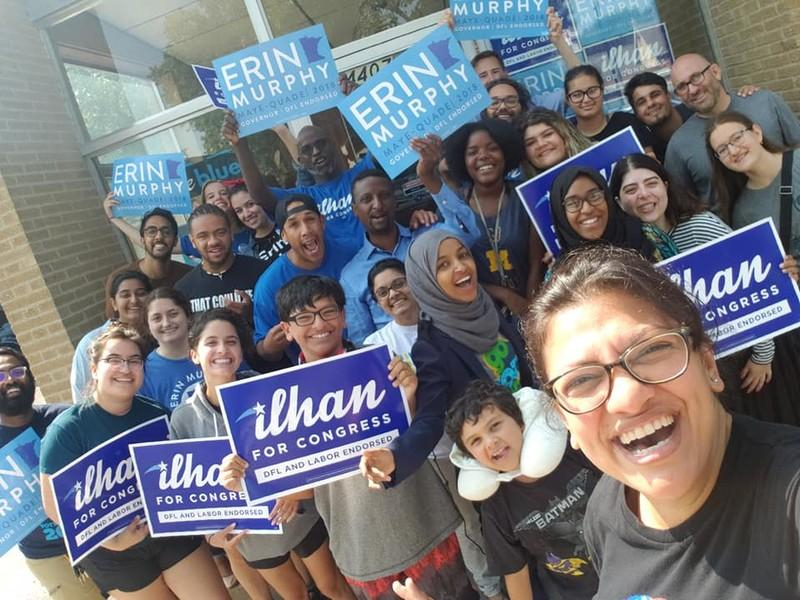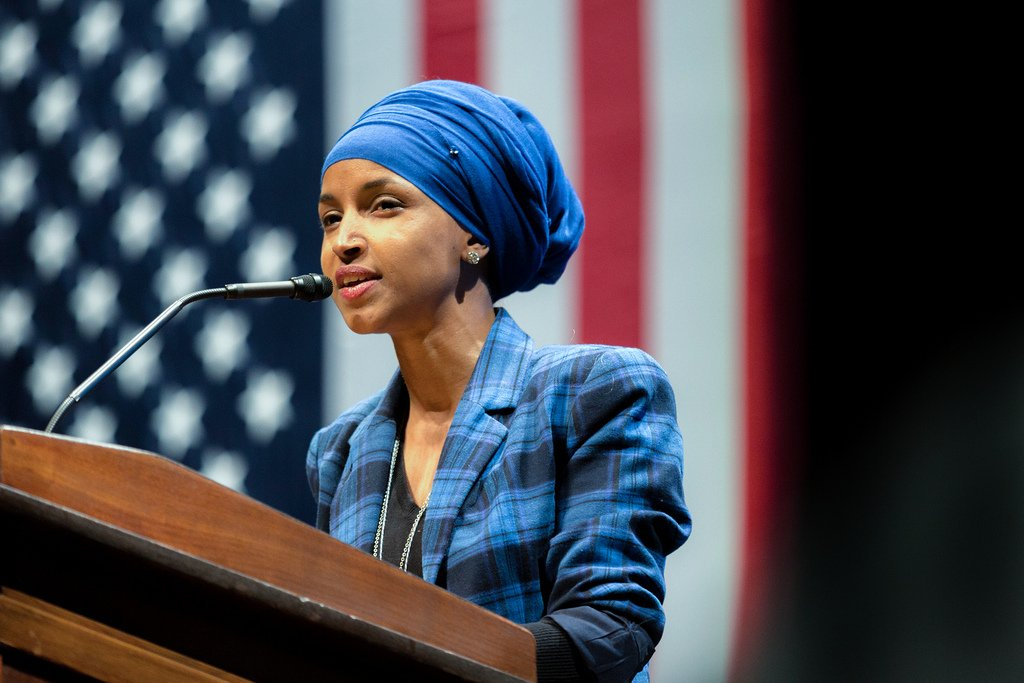Rep. Ilhan Omar's Challenges and Controversies - A Timeline of Events
Current Events
|
Mar 8, 2019
|
6 MIN READ

Let’s start at the end, which is not even really the end of the spotlight and massive media attention paid to freshman Representative Ilhan Omar (D-MN), the first Black Muslim woman in Congress - who also happens to wear a hijab. In response to this week’s vote by the House of Representatives that overwhelmingly passed a resolution condemned anti-Semitism and anti-Muslim discrimination, Reps. Omar, Rashida Tlaib (D-MI) and Andre Carson (D-IN) issued the following statement:
Today is historic on many fronts. It’s the first time we’ve voted on a resolution condemning Anti-Muslim bigotry in our nation’s history. Anti-Muslim crimes have increased 99% from 2014-2016 and are still on the rise.We are tremendously proud to be part of a body that has put forth a condemnation of all forms of bigotry, including anti-Semitism, racism, and white supremacy. At a time when extremism is on the rise, we must explicitly denounce racial intolerance of all kinds and acknowledge the pain felt by all communities. Our nation is having a difficult conversation, and we believe this is great progress.

What led to this vote and this statement? In our continuing coverage Ilhan, we are breaking down the series of events in the past two weeks that stirred such an uproar and increased division not only between the Democratic and Republican parties, but within the Democratic Party itself. Her nomination as one of the first Muslim women in Congress - and the first hijabi Muslim women - has been such a source of pride and joy for so many Muslim women that we felt it was important to share this timeline of her struggles and ongoing controversies with you.
January 3, 2019 - Ilhan Omar (and Rashida Tlaib) are sworn into Congress as the first Muslim women representatives. Ilhan is also the first to wear a hijab as a sitting Congresswoman, a right for which she had to fight to change a 181-year-old ban on hats in Congress.
January 17 or thereabouts, 2019 - Ilhan is appointed to the House Foreign Affairs Committee, which votes on funding (among other things) arms to Saudi Arabia, a country that has heavily criticized her in the past. As reported by Business Insider, the committee also oversees “bills and investigations related to U.S. foreign affairs and has the power to boost or cut U.S. exports of arms and technologies to other states.” Naturally there are immediate criticisms of this appointment.
Sometime in January, 2019 - Ilhan apologizes for an old 2012 tweet in which she had said that Israel “hypnotized the world,” which critics said brought up old anti-Semitic motifs. In her disavowment of that tweet, she tweets, “It’s now apparent to me that I spent lots of energy putting my 2012 tweet in context and little energy disavowing the anti-Semitic trope I unknowingly used, which is unfortunate and offensive.”
Around February 9-10, 2019 - Rep Kevin McCarthy (R-CA) takes issue with Ilhan and calls for “action” against her and fellow Congresswoman Rashida Tlaib but does not exactly say what action he wants to take place.
February 10, 2019 - Ilhan issues a tweet that starts a chain reaction of cries of anti-Semitism and more against her. She retweets journalist Glenn Greenwald, who had shared an article about McCarthy (still following me here?) and adds this comment - “It’s stunning how much time U.S. political leaders spend defending a foreign nation even if it means attacking free speech rights of Americans.” Then Ilhan adds the tweet that starts it all: “It’s all about the Benjamins, baby” with a music emoji at the end of the tweet.
This music emoji is important to note, because many then argue that she is referring a Puff Daddy song, “It’s All About the Benjamins,” meaning money. However …
Bataya Ungar-Sargon, who is the opinion editor at The Forward (a Jewish media site), tweet’s Omar’s “Benjamins” tweet, asking this question: “Would love to know who @IlhanMN thnks is paying American politicians to be pro-Israel, though I think I can guess. Bad form Congresswoman. That’s the second anti-Semitic trope you’ve tweeted.”
Omar quote-tweets Bataya’s tweet and adds one word: “AIPAC.”
And that’s when it every thing blows wide open.
So, what is AIPAC? It’s the American Israel Public Affairs Committee, the most influential pro-Israel lobbying group and one of the most influential lobbying groups period.
Criticism of AIPAC is uncommon in Washington, D.C., as the group wields huge swaths of influence over a myriad of policy positions and political candidates. Ilhan is immediately raked over the coals for her tweets. But, as Mehdi Hasan writes in The Intercept, the whole controversy over Omar’s remarks is bizarre especially coming from Democrats, because they “loudly and rightly decry the pernicious and undeniable impact of special interests, lobbyists and donations on a whole host of issues - from the role of Big Pharma and Big Finance; to influence-peddling by Saudi Arabia, to the ‘grip’ that the NRA has on the debate over gun control … But any mention of AIPAC and lobbying in favor of Israel? ‘Anti-Semitism!’”

Her apology, as to be expected, is accepted by some but decried by others in Washington as insincere, among other things.
February 27, 2019 - Ilhan appears along with Rashida at an event at Busboys & Poets, a bookstore and cafe in Washington, D.C. There, she talks about a number of things, but what once again sparks huge controversy is when she says, “I want to talk about the political influence in this country that say it is OK for people to push for allegiance to a foreign country.”
Immediately Ilhan’s critics accuse her of saying that Jewish people in the U.S. have a “dual loyalty” to America and Israel, and that is anti-Semitic. Rep. Eliot Engel, who is the Democratic chair of the House Foreign Affairs Committee, says, “I welcome debate based on the merits of policy, but it’s unacceptable and deeply offensive to call into question the loyalty of fellow American citizens because of their political views … Worse, Representative Omar’s comments leveled that charge by invoking a vile anti-Semitic slur.” Others say she didn’t say any such slur.
However, you may want to watch the video of what Ilhan said and decide for yourself:
In the meantime …
March 1, 2019 - In the West Virginia statehouse, a poster is put on display that says “‘NEVER FORGET’ - YOU SAID, with an image of the World Trade Centers under attack and smoking as well as an image of Ilhan, adding, “I AM THE PROOF YOU HAVE FORGOTTEN.” The poster is hung outside the building as part of a celebration of the state’s Republican party. Anne Lieberman, the West Virginia GOP’s sergeant at arms, resigns after she is accused of saying “All Muslims are terrorists.”
In Washington, there is little alarm sounded for the Islamophobic poster as well as other threats Ilhan has received. She says the poster is just one in a series of attacks against her, which include graffiti calling for her assassination in her home state of Minnesota. “No wonder why I am on the ‘Hitlist’ of a domestic terrorist and ‘Assassinate Ilhan Omar’ is written on my local gas stations,” she says in a tweet.

March 6, 2019 - House Democrats take floor action by drafting a resolution to address the ongoing controversy by detailing the history and recent rise of anti-Semitism in the U.S. It does not specifically name Ilhan, but condemns the myth of “dual loyalty.” This resolution, if voted on, would be an unprecedented public rebuking of Ilhan. However, Muslim and Jewish groups, like MPower Change and Jews with Ilhan, take to flooding Democrats’ offices, emails and voicemails in support of Ilhan. An #IStandwithIlhan campaign is launched.
March 6, 2019 - The vote on the resolution condemning anti-Semitism and bigotry is put off after a backlash from lawmakers who say Ilhan is being unfairly singled out. Rep. Steny H. Hoyer (D-MD) tells reporters that the language of the resolution is still being drafted.
March 7, 2019 - The House of Representatives passes a revised version of the resolution that condemns many forms hate and intolerance, including anti-Muslim bigotry. It passes resoundingly - 407-23, with 23 Republicans voting against the measure. All Democrats, including Ilhan, vote in support of it. Following the passage of the resolution, Ilhan, Rashida and Indian’s Andre Carson issue their statement, which is included at the start of this timeline.
It’s a lot to digest, but we felt it was important to lay out everything for you, our readers, in as methodical a way as possible. Read the articles and think about it for yourself. How do you feel? What are your thoughts?
Image sources: Twitter and Wikimedia Commons.
Subscribe to be the first to know about new product releases, styling ideas and more.
What products are you interested in?

